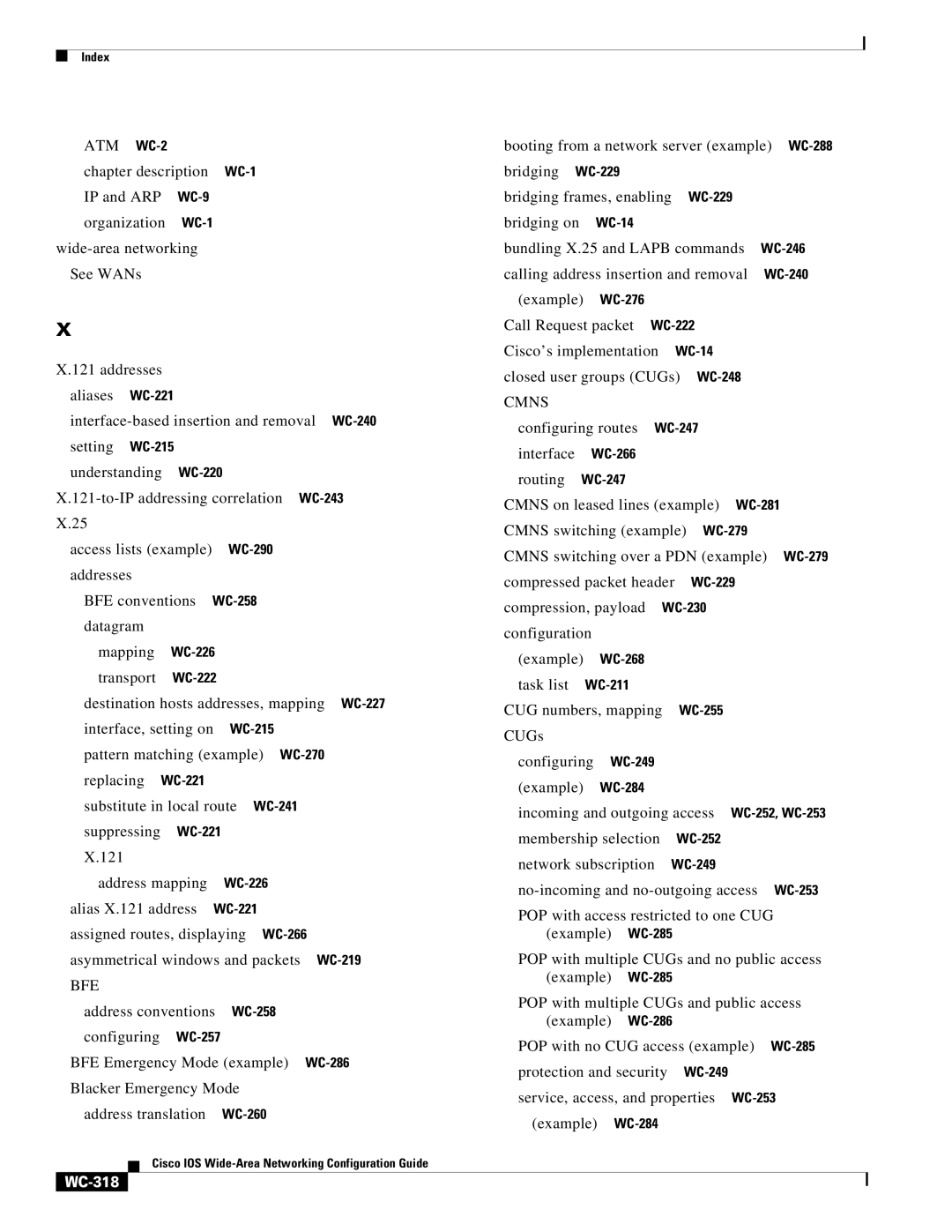
Index
ATM WC-2
chapter description
X
X.121 addresses |
|
|
|
|
|
| |
aliases |
|
|
|
|
| ||
setting |
|
|
|
|
| ||
understanding |
|
|
| ||||
X.25 |
|
|
|
|
|
|
|
access lists (example) |
|
|
| ||||
addresses |
|
|
|
|
|
| |
BFE conventions |
|
| |||||
datagram |
|
|
|
|
|
| |
mapping |
|
|
|
| |||
transport |
|
|
|
| |||
destination hosts addresses, mapping | |||||||
interface, setting on |
|
| |||||
pattern matching (example) |
| ||||||
replacing |
|
|
|
|
| ||
substitute in local route |
|
| |||||
suppressing |
|
|
|
| |||
X.121 |
|
|
|
|
|
|
|
address mapping |
|
|
| ||||
alias X.121 address |
|
| |||||
assigned routes, displaying |
| ||||||
asymmetrical windows and packets | |||||||
BFE |
|
|
|
|
|
|
|
address conventions |
|
| |||||
configuring |
|
|
|
| |||
BFE Emergency Mode (example) | |||||||
Blacker Emergency Mode |
|
|
| ||||
address translation |
|
|
| ||||
Cisco IOS
booting from a network server (example) | |||||||||
bridging |
|
|
|
|
|
| |||
bridging frames, enabling |
|
|
| ||||||
bridging on |
|
|
|
|
|
| |||
bundling X.25 and LAPB commands | |||||||||
calling address insertion and removal | |||||||||
(example) |
|
|
|
|
|
| |||
Call Request packet |
|
|
| ||||||
Cisco’s implementation |
|
|
| ||||||
closed user groups (CUGs) |
|
| |||||||
CMNS |
|
|
|
|
|
|
|
|
|
configuring routes |
|
|
| ||||||
interface |
|
|
|
|
|
|
| ||
routing |
|
|
|
|
|
| |||
CMNS on leased lines (example) |
| ||||||||
CMNS switching (example) |
|
| |||||||
CMNS switching over a PDN (example) | |||||||||
compressed packet header |
|
|
| ||||||
compression, payload |
|
|
| ||||||
configuration |
|
|
|
|
|
|
| ||
(example) |
|
|
|
|
|
| |||
task list |
|
|
|
|
|
|
| ||
CUG numbers, mapping |
|
|
| ||||||
CUGs |
|
|
|
|
|
|
|
|
|
configuring |
|
|
|
|
| ||||
(example) |
|
|
|
|
|
| |||
incoming and outgoing access | |||||||||
membership selection |
|
|
| ||||||
network subscription |
|
|
| ||||||
POP with access restricted to one CUG |
| ||||||||
(example) |
|
|
|
|
| ||||
POP with multiple CUGs and no public access | |||||||||
(example) |
|
|
|
|
| ||||
POP with multiple CUGs and public access | |||||||||
(example) |
|
|
|
|
| ||||
POP with no CUG access (example) | |||||||||
protection and security |
|
|
| ||||||
service, access, and properties |
| ||||||||
(example) |
|
|
|
|
| ||||
